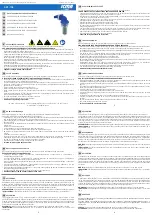
PCL-730 User Manual
12
3.1
Overview
Maintaining signal connections is one of the most important factors in ensuring that
your application system is sending and receiving data correctly. A good signal con-
nection can avoid unnecessary and costly damage to your PC and other hardware
devices. This chapter provides useful information about how to connect input and
output signals to the PCL-730 via the I/O connector.
3.2
Connector Pin Assignments
The PCL-730 has four on-board 20-pin flat-cable connectors (insulation displace-
ment, mass termination) and a DB-37 connector accessible from the card bracket.
See the figure on page 7 for the location of each connector.
Pin assignments for each connector appear in the following sections.
*NOTE: When JP4 is set to B1, Pin 19 on CN1 and Pin 10 on CN6 will both be
assigned PCOM1. When JP4 is set to A1, both pins will be assigned E.GND. For
JP5, Pin 17 & 19 and Pin 18 & 20 on CN2 will combine together (be the same GND)
when JP5 is set to A1. But Pin 17 & 19 and Pin 18 & 20 on CN2 will be different GND
(EI.GND1 and EI.GND2 separately) when JP5 is set to B1.
Summary of Contents for PCL-730
Page 1: ...User Manual PCL 730 32 ch Isolated Digital I O ISA Cards ...
Page 6: ...PCL 730 User Manual vi ...
Page 8: ...PCL 730 User Manual viii ...
Page 9: ...Chapter 1 1 Overview ...
Page 13: ...Chapter 2 2 Hardware Installation ...
Page 19: ...Chapter 3 3 Signal Connections ...
Page 21: ...13 PCL 730 User Manual Chapter 3 Signal Connections ...
Page 24: ...PCL 730 User Manual 16 ...
Page 25: ...Appendix A A Register Format ...
Page 27: ...Appendix B B PC I O Port Address Map ...
Page 29: ...21 PCI 1730 1733 1734 User Manual Appendix B PC I O Port Address Map ...











































